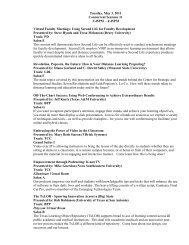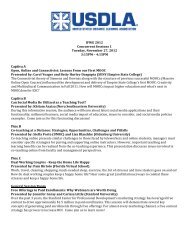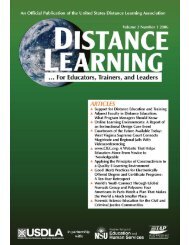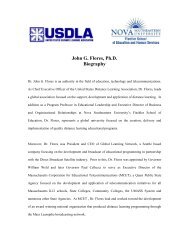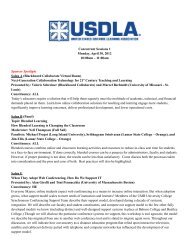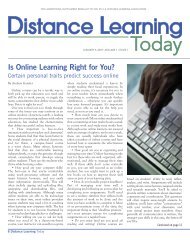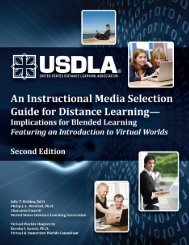United States Distance Learning Association
United States Distance Learning Association
United States Distance Learning Association
- No tags were found...
Create successful ePaper yourself
Turn your PDF publications into a flip-book with our unique Google optimized e-Paper software.
New Media, New <strong>Learning</strong><br />
School for Tykes<br />
Craig Ullman<br />
Arecent article in The New York<br />
Times (“The Garlanded Classroom,”<br />
by Graham Bowley, September<br />
23, 2007) discussed the latest new<br />
trend in tyke education: “the Reggio Emilia<br />
system.” From the article:<br />
The approach is based on the assumption<br />
that children learn best in groups and are<br />
resourceful enough to come up with their<br />
own ideas for lessons. Under the Reggio<br />
Emilia system, children investigate<br />
themes like angels or elevators; in one<br />
Craig Ullman, Partner, Networked Politics,<br />
49 West 27th St., Suite 901,<br />
New York, NY 12401.<br />
Telephone: (646) 435-0697.<br />
E-mail: cullman@networkedpolitics.com<br />
famous example, they built water wheels<br />
and fountains for an amusement park for<br />
birds. The method so engages and electrifies<br />
children, its supporters contend, that<br />
they create work of unparalleled beauty<br />
and complexity. (para. 5)<br />
The children choose their own projects;<br />
the Reggio Emilia system, according to the<br />
article, is much more open-ended than a<br />
Montessori school, for instance. Quite a<br />
number of schools in the Upper East Side<br />
of Manhattan and in some other areas of<br />
the country have adopted or been inspired<br />
by the Reggio Emilia system.<br />
Two things strike me about Reggio<br />
Emilia—the contrasting view of childhood,<br />
and the political mashup that occurs when<br />
this system is used in the <strong>States</strong>.<br />
The traditional British classroom that<br />
was one of their legacies to us had a particular<br />
view of childhood: each little boy and<br />
girl is a potential miscreant. If left to their<br />
own devices, every public classroom<br />
would become a miniature Lord of the Flies.<br />
The ultimate value of school for children is<br />
for them to learn self-discipline by internalizing<br />
their submission to adult authority.<br />
Although a lot has changed in<br />
American nursery and grade schools over<br />
the last several hundred years, this kind of<br />
thinking about children and school still<br />
runs deep in our culture.<br />
The Reggio Emilia system turns all that<br />
on its head by propagating a view of child-<br />
Volume 4, Issue 4 <strong>Distance</strong> <strong>Learning</strong> 97





